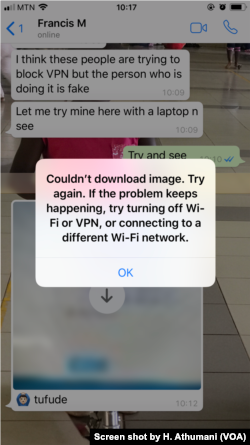A group of Ugandan lawyers have challenged the legality of a controversial social media tax that took effect on July 1. The government introduced a tax for all social media users in the country to curb what President Yoweri Museveni called “rumor mongering” on social media. But opponents of the new tax say it is designed to silence online critics of his government.
A group of Ugandan lawyers, led by Kiiza Eron, asked the Constitutional Court Monday to throw out the government’s new tax for accessing social media. They argue that it limits freedom of expression and assembly online.
“This tax is not meant to generate revenue. This tax is meant to clamp down on free expression. It is meant to inhibit political organization online. And it is going to stifle business startups who are using the social media. Of course we are we are seeking for a nullification of the law which we think is both unreasonable, unnecessary and illegal,” said Eron.
The new tax will cost each social media user about $2 per month.
It targets social media platforms such as WhatsApp, Twitter, Viber, Facebook and Instagram among others.
Early this year President Yoweri Museveni explained that the tax is needed to cope with the consequences of gossip.
The president’s phrasing raised concerns the tax could be used to crack down on criticism of the government online.
Uganda’s Minister for Information Technology and Communications, Frank Tumwebaze, defended the new tax, known as Over the Top Tax Services (OTTS).
“We are targeting the OTTS, because people are preferring them because there is no much cost. So we are saying, that money you are donating to the intellectual property owners of Whatsapp and Skype, let government also pick a shilling. It’s a tax on specific value added services,” said Tumwebaze.
A couple of young people thought a protest was in order and took to the street - only to be detained as they approached the parliament.
Like most social media users, Christine Nabatanzi opposes the new tax.
“Paying that 200 shillings, its unjustifiable daily. First of all me I need social media according to the work I do," said Nabatanzi. "Secondly where do all the taxes that the government collects go? We are paying so many taxes, local government taxes, pay as you earn, but the services are very poor. We have no roads foremost, we have no drugs in hospitals. We have no good schools, where do the taxes go?”
The Ugandan government hopes to collect over $400 million annually from the social media tax.
However, many Ugandans are using virtual private networks, VPNs, to evade paying the new tax, despite the risk of being prosecuted for tax evasion.






